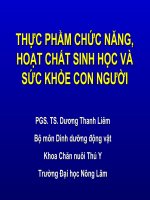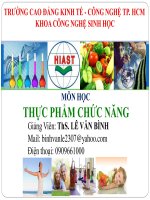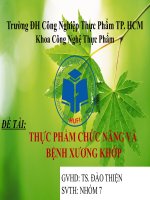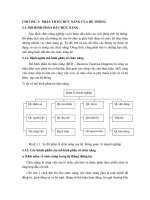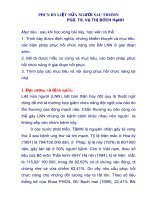Bài giảng thực phẩm chức năng dietry fiber
Bạn đang xem bản rút gọn của tài liệu. Xem và tải ngay bản đầy đủ của tài liệu tại đây (1.2 MB, 15 trang )
1.3. Chất xơ tiêu hóa
(Chất xơ thực phẩm,
dietary fiber)
“Thực phẩm chức năng”; Bài giảng cho sinh viên ngành
CN Thực phẩm và CN Sinh học
ĐH Bách khoa Hà nội
1.3. Dietary fiber
1
Concept of dietary fiber
• 1953: Hispley described plant cell wall components of foods,
which he suggested to be protective against toxemia during
pregnancy
• 1970s: relationships between diet and incidence of chronic
disease, in particular the role of polysaccharides in the diet
• 1990s: beneficial effects of dietary fibre
•
•
•
•
•
regulation of the gastrointestinal motility
influence glucose and lipid metabolism, promote faecal ouput
stimulate bacterial metabolic activity,
detoxify the colon luminal
contents and contribute towards maintaining the equilibrium of the colon
ecosystem and integrity of intestinal mucosa
Khái niệm
• 1953: Hispley đưa ra khái niệm xơ tiêu hóa (gồm
thành tế bào thực vật) trong phòng ngừa nhiễm độc
máu thai nghén
• Những năm 1970: Vai trò của polysaccharide trong
tiêu hóa ngăn ngừa các bệnh mãn tính
• Những năm 1990: Vai trò của thành tế bào thực vật
•
•
•
•
•
•
điều hòa vận động ruột,
ảnh hưởng đến chuyển hóa lipid và glucose,
tăng lượng phân,
kích thích hoạt đọng trao đổi chất của vi khuẩn,
thải độc,
làm cân bằng hệ sinh thái đường ruột và bảo toàn niêm mạc
ruột
2
Different definitions of dietary fiber
Organisation or countries
COST (1994) European
Concerted Action for Cooperation on Science and
Technology
Definition and constituents of dietary fibre
Lignin, inositolphosphate, resistant starch,
oligosaccharides, plant cell-wall polysaccharides,
inulin,
polydextrose
CIAA (1992)
Confederation of the Food and
Drink Industries of the European
Union
CEEREAL (1993)
European Breakfast cereal
Association
Belgium (1993)
Organic constituents non-hydrolysed by human
digestive
enzymes
Indigestible polysaccharides + lignin
Indigestible oligo + indigestible polysaccharides +
lignin
Indigestible polysaccharides + lignin
Croatia, Germany, Norway and
Sweden (1993)
Scientific Committee for Foods Oligosaccharides and polysaccharides and hydrophilic
derivatives that are not digested and not absorbed in the
(1994)
upper gut of humans, including lignin
Definition of dietary fibre
AACC (1999)
• Dietary fibre is the remnants of the edible part of plants
and analogous carbohydrates that are resistant to digestion
and absorption in the human small intestine with complete
or partial fermentation in the human large intestine. It
includes polysaccharides, oligosaccharides, lignin and
associated plant substances.
• Dietary fibre exhibits one or more of either laxation (faecal
bulking and softening; increased frequency; and/or
regularity), blood cholesterol attenuation, and/or blood
glucose attenuation
AACC: the American Association of Cereal Chemists
DeVries, On defining dietary fibre, Proceedings of the Nutrition Society (2003), 62, 37–43
3
Một số định nghĩa và thành phần xơ thực phẩm
Tổ chức, nước
COST (1994)
Định nghĩa và thành phần xơ thực phẩm
Lignin, inositolphosphate, tinh bột bền “resistant starch”, oligosaccharide,
polysaccharide ở thành tế bào thực vật, inulin, polydextrose
CIAA (1992)
Thành phần chất hữu cơ không thủy phân được bởi các enzyme tiêu hóa
trong cơ thể người
Polysaccharide không tiêu hóa được + lignin
Oligo-, Polysaccharide không tiêu hóa được + lignin
CEEREAL (1993)
Bỉ (1993)
Croatia,Đức,Nauy, Thụy
Điển (1993)
Hội đồng khoa học thực
phẩm (1994)
AOAC Hiệp hội hóa
nông Mỹ (2000)
Polysaccharide không tiêu hóa được + lignin
Oligo-, Polysaccharide và các dẫn xuấtkhông tiêu hóa được và không bị
hấp thụ ở phần trên đường ruột bao gồm cả lignin
Phần còn lại của thực vật hoặc các chất tương tự carbohydrate bền trong
quá trình tiêu hóa và không được hấp thụ ở ruột non, bị lên men hoàn
toàn hoặc một phần ở ruột già. Bao gồm poly- , oligosaccharide, lignin và
các hợp chất liên quan. Xơ tiêu hóa có tác dụng nhuận tràng hoặc/và giảm
cholesterol máu, hoặc/và giảm gluco trong máu.
Classification and chemical characteristics
of the main dietary fibres (1)
Class
Components
Polysacchari Cellulose
Hemicellulose
des of cell
walls in
higher plants
Structure
β-D-glucan
Xyloglucan
Xylan
ArabinoxylanGlucuronoarabinoxylan
Mixed linkage -D-glucan (3and 4-linked)
Pectic
susbtances
Other
molecules
Lignin
Galacturonans and
rhamnogalacturonans
Arabinan(alpha-L-5 linked,
with attached side chains)
Arabinogalactan 1 (beta-D-4
linked galactan with attached
side chains)
Complex polyphenolic
polymer
Sources
No fractionated plant
material
Dicotyledons
Dicotyledons
Monocotyledons
Monocotyledons, more
abundant
in barley, oat grains
Dicotyledons
Mature plants
4
Classification and chemical
characteristics of the main dietary fibres
5
Phân loại chất xơ thực phẩm (1)
Loại
Thành phần
Polysaccharide từ Cellulose
thành tế bào thực Hemicellulose
vật bậc cao
Các hợp chất
pectin
Các phân tử khác
Lignin
Cấu trúc
Nguồn chính
Vật liệu thực vật
không phân đoạn
Cây hai lá mầm
Cây hai lá mầm
Cây một lá mầm
β-D-glucan
Xyloglucan
Xylan
ArabinoxylanGlucuronoarabinoxylan
Hỗn hợp liên kết β-D-glucan
(lien kết vị trí 3- và 4-)
Galacturonan và
rhamnogalacturonan
Arabinan (liên kết α-L-5 có chuỗi
gắn kèm)
Arabinogalactan 1 (β-D-4
galactan có chuỗi gắn kèm)
Poly mer polyphenol phức tạp
Một lá mầm,
nhiều trong đại
mạch, hạt yến
mạch
Cây hai lá mầm
Thực vật trưởng
thành
Phân loại chất xơ thực phẩm (2)
Loại
Thành phần
Hydrocolloid Carageenan
tách chiết từ
rong tảo biển
Alginate
Cấu trúc
Polymer suphat hóa của
galactose và anhydrogalactose
Nguồn chính
Tảo đỏ Chondrus crispus
Polymer của axit D Mannuronic
và L-guluronic
Rong nâu Laminaria
digitata, Laminaria
hyperborean,
Ascophylum nodosion,
Fucus serratus
Nguồn vi sinh Xanthan gum
vật
Giống cellulose có trisaccharide
gồm α-D-manose, axit Dglucuronic, β- D manose
Xanthomonas campestris
Mạch thẳng cấu tạo bởi 1,3beta-D-glucose, 1,4-beta-Dglucuronic acid, 1,4
beta-D-glucose and 1,4-alpha D
rhamnose
Pseudomonas elodea
Gellan gum
6
Phân loại chất xơ thực phẩm (3)
Loại
Nhựa cây
Thành phần
Gum arabic
Gum Karaya
Gum tragacanth
Chiết xuất từ
hạt
Guar gum
Gum carob
Psyllium
Cấu trúc
Cấu trúc gần giống arabinogalactan
loại II với chuỗi phức tạp hơn
Cấu trúc gần giống pectic, mạch
nhánh chứa glucuronic acid
Cấu trúc Pectic và arabinogalactan II
Nguồn chính
Các loài cây keo
Cây Trôm
(Sterculia)
Cây đậu ván dại
Astragalus
gummifer
Galactomannan, tỷ lệ D-galactose và Nội nhũ của các
D-mannose : 1 : 2
hạt họ đậu
Cyamopsis
teragonolobus
Galactomannan, tỷ lệ D-galactose và Cerotona siliqua
D-mannose : 1 : 4
Polysaccharide cấu tạo từ arabinose, Cây mã đề bọ chét
xylose và galacturonic acid
Plantago ovata
Phân loại chất xơ thực phẩm (4)
Loại
Chiết xuất từ rễ
Thành phần
Konjac
Cấu trúc
Acetylated glucomannan
Cellulose biến
tính và
pectins
Cellulose
Carboxymethyl cellulose
Methyl cellulose
Hydroxypropylmethyl
cellulose
Methyl ester hóa bậc thấp Bã táo, vỏ quả
hoặc cao,
cam chanh
Pectins amin hóa
Pectins
Nguồn chính
Cây nưa Konjac
(Amorphophall
us konjac)
7
Dietary fibre content of some foods
(g/100 g edible portion)
(FAO/WHO 1997)
Thành phần chất xơ trong một số
thực phẩm(g/100g phần ăn được)
Thực phẩm
Độ ẩm
Chuối
Đậu Pháp (đỗ quả)
Đậu xanh
Đậu lăng xanh
Khoai tây
Lúa mỳ
Ngô
Gạo
Yến mạch
(FAO/WHO 1997)
75,1
13,3
11,3
10,8
79,6
14,0
12,0
11,8
8,9
Thành phần xơ
Polysaccharide
Xơ tổng số
không phải tinh
bột
1,1
1,6
4,7
17,0
40,0
8,9
1,3
1,8
9,0
12,6
11,0
2,0
3,5
6,8
10,3
8
Dietary fibre and its effect on the
gastrointestinal tract
Tính chất hóa lý và hiệu quả sinh lý
•
•
•
•
•
•
Độ nhớt
Tính hút nước
Hấp thụ muối mật
Bã của quá trình lên men
Kích thước hạt
Khả năng giữ nước
•
•
•
•
Chuyển hóa Glucose và
lipid
Béo phì, tiểu đường, các
bệnh tim mạch
Vận chuyển phân
Sức khỏe ruột
9
Fermentation and its effects on colonic
physiology
Quá trình lên men và ảnh hưởng đến sinh lý
ruột
10
Recommended intake
Liều lượng khuyến cáo
11
Source of Dietary fiber
• Endogenous
• Concentrate
• Dried fruits
• Agricultural co-products and food byproducts
• Isolate from foods
Các dạng sử dụng
• Thành phần tự nhiên của thực phẩm
• Dạng cô đặc
• Hoa quả sấy
• Sản phẩm phụ của nông nghiệp và thực
phẩm
• Dạng tách chiết từ thực phẩm
12
Dietary fiber manufacturing
• Fiber in food production:
• Texture for food processing
• Functionality
• Physcochemical properties play important roles
•
•
•
•
Structure
Hydration
Lipid holding/releasing ability
Colour, taste
• Technology of secondary generation dietary fiber
Sản xuất xơ tiêu hóa
• Chất xơ trong sản xuất thực phẩm có vai trò kép:
• Chất tạo cấu trúc cho thực phẩm chế biến
• Biểu hiện tính chức năng
• Tính chất lý hóa của chất xơ đóng vai trò quan trọng
•
•
•
•
Cấu trúc không gian
Tính chất hút nước, lưu biến
Khả năng giữ/nhả chất béo
Màu sắc, hương vị
• Kỹ thuật sản xuất chất xơ “thế hệ thứ 2” nhằm tăng tính
chức năng
13
Dietary fiber manufacturing
• Grinding
• reduces particle size
• disrupt the crystalline order of cellulose
• Increase contacting surface Increase absorbtion effect
• Heat treatment
• Thermo-mechanical treatment (extrusion, “instant
controlled depression”)
• Chemical treatments
• Enzyme treatment (pectinase, cellulase,…)
Sản xuất chất xơ tiêu hóa
• Nghiền (các loại bột cám)
• Giảm kích thước
• Phá vỡ cấu trúc tinh thể của cellulose
• Tăng diện tích tiếp xúc -> tăng khả năng hấp thụ
•
•
•
•
Các phương pháp xử lý nhiệt
Xử lý cơ nhiệt (ép đùn, “instant controlled depression”)
Xử lý hóa chất
Xử lý bằng enzyme (pectinase, cellulase,…)
14
Tài liệu tham khảo
• Gibson & Williams (Eds) (2000). Functional Food:
Concept to product. Woodhead Publishing Limited CRC
Press LLC
15



